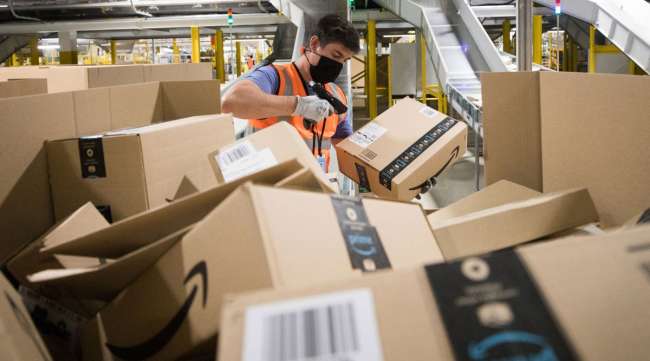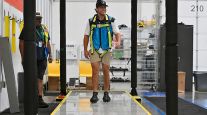Amazon’s Prime Day Steals Rivals’ Black Friday Spotlight

[Ensure you have all the info you need in these unprecedented times. Subscribe now.]
Amazon.com Inc.’s two-day Prime Day sale kicked off on Oct. 13 and is expected to give the world’s largest e-commerce company an early advantage over brick-and-mortar rivals still contending with pandemic-spooked consumers wary of battling Black Friday crowds.
With Prime Day delayed to October from July this year, Amazon single-handedly could yank the pivotal holiday season forward — a long-predicted “Christmas creep.” More than three in four consumers plan to shop earlier this year than a year ago, with a third citing health and safety concerns, according to an International Council of Shopping Centers survey released Oct. 9. Meanwhile a Harris Poll conducted with Bloomberg found that almost half of consumers plan to do most or all of their shopping on the Web.
It’s a winning combination for Amazon, which earlier this year hired more than 175,000 people for its sprawling network of fulfillment centers after a spike in online orders briefly overwhelmed the company, forcing it to delay some deliveries. Amazon reported record profits last quarter, and investors have pushed the shares up some 85% this year, giving the company a market value of about $1.7 trillion.
“Holiday spending will keep shifting from brick-and-mortar stores to online, and Amazon is very well aligned with those trends,” said Andrew Lipsman, an analyst at eMarketer Inc. who expects online spending of almost $10 billion over the two-day period, with more than $6 billion spent on Amazon.

A package is scanned as it moves along a conveyor belt at an Amazon center in the U.K. on Oct. 12. (Chris Ratcliffe/Bloomberg News)
Amazon didn’t tinker much with Prime Day, despite the delay. Deals in the first several hours were mostly discounts of 50% off or less on household goods, electronics and clothes priced at no more than $50, with the bigger deals expected later in the day, said Juozas Kaziukenas, founder of Marketplace Pulse, a New York research firm that monitors the site. Live video streams highlighting deals were pushed lower on the page, a change from last year when they got top billing.
“I’m sure Amazon will reach record sales again,” Kaziukenas said, “but not because they did something unique this year.”
Amazon’s delivery machine, conceived for convenience, now offers the added benefit of safety compared with in-store shopping. Consumers initially turned to the company to stock up on toilet paper and hand sanitizer in April. Then they needed electronics to help families work and attend school from home. Summer became a season of patio furniture and swimming pools ordered online for staycations.
Now come the holidays, Amazon’s busiest time of year, with COVID-19 cases spiking yet again. That means Amazon could continue to generate double-digit sales growth despite a weak job market and congressional gridlock over further stimulus packages such as $600 weekly unemployment assistance that expired this summer.

Home | Video | Heroes' Photo Gallery
Saluting the men and women of the trucking industry who kept America's essential goods flowing during the coronavirus pandemic.
Heroes: Peter Lacoste | Susan Dawson | James Rogers | Reggie Barrows | Kevin Cooper | Cesar Quintana Moreno
Prime members who didn’t lose their jobs could actually have a little extra to spend and feel the urge to splurge since most households have cut back on travel, eating out and other expenses, said Jack Kleinhenz, chief economist at the National Retail Federation.
“People might just have more confidence of buying a little more and thinking, ‘Oh, I owe it to myself in a tough time,’” he said.
Amazon competitors who still get most revenue in stores have to balance drumming up business with protecting public health. Eight in 10 shoppers say they’re concerned packed stores could spread COVID-19, meaning retailers that aren’t offering deals online could lose out.
The industry for weeks has been trying to coax consumers to spend earlier. Executives from American Eagle Outfitters Inc. and Kohl’s Corp. said they expect earlier demand. Retail veteran Deborah Weinswig got two dozen retailers to start a new shopping holiday, “10.10,” to address capacity issues and encourage shoppers to buy earlier. Target Corp. and Walmart Inc. rolled out their promotional days this week as well.
The latter last month started its own delivery service, Walmart+, and Target is shipping packages from its stores. But Amazon has 118 million U.S. Prime members, according to Consumer Intelligence Research Partners, subscribers the company keeps loyal with delivery discounts and other perks. Amazon launched Prime Day in 2015 as a day of deals to attract new subscribers and hang on to existing ones. Prime members spend more on the site than non-members.

What are industry executives doing to help bring more women into the fold, not only as drivers, but in leadership roles? Host Michael Freeze talks with Ellen Voie of Women In Trucking and Debora Babin Katz of TrucBrush Corp. Hear a snippet, above, and get the full program by going to RoadSigns.TTNews.com.
For years, retailers have tried to get shoppers to spread out their purchases over the holiday by offering deals early and often. The phenomenon was dubbed “Christmas creep,” and it never entirely materialized because many shoppers procrastinate, waiting for Black Friday and Thanksgiving deals before getting serious about buying gifts. The pandemic has finally made “Christmas creep” a reality, analysts say, because shoppers are worried about items running out and getting online orders in time.
“Amazon Prime Day is going to kick off the holiday season and holiday shopping for many consumers,” said Chip Bergh, the chief executive officer of Levi Strauss & Co. “We know the capacity constraints with shipping because of the surge in e-commerce, so consumers are going to be urged to buy early.”
Spencer Soper, Jordyn Holman and Henry Ren were the primary contributors to this report.
Want more news? Listen to today's daily briefing:
Subscribe: Apple Podcasts | Spotify | Amazon Alexa | Google Assistant | More




